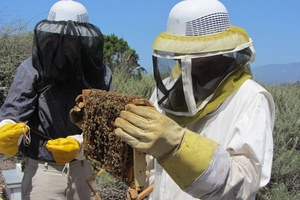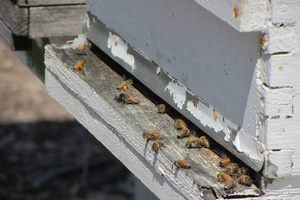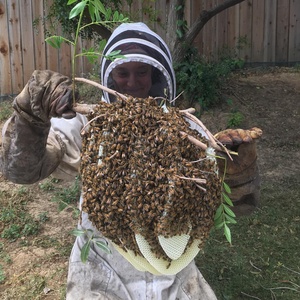Bee Background
 https://www.facebook.com/b33conscious/
https://www.facebook.com/b33conscious/
The UCSB and Isla Vista community has had a fruitful relationship with bees throughout the years. Beginning in 2013, the Bee Conscious organization emerged with hopes to ignite local interest in beekeeping. According to their Facebook page, this campus organizations mission statement was “working with and learning about bees through beekeeping and other activities.” Although, the Facebook page seemed lively with multiple beekeeping events, Bee Conscious only lasted until 2015.
 https://www.facebook.com/b33conscious/
https://www.facebook.com/b33conscious/  https://www.facebook.com/b33conscious/
https://www.facebook.com/b33conscious/
Another UCSB Beekeeping club has emerged in 2017 headed by Bela Lafferty. According to Lafferty, this new club strives to educate about bees and encourage overall conservation. Furthermore, the club works as a forum for learning about biodiversity and pragmatic learning apiculture, as well as providing information regarding how to care for bees and raise them sustainably. Although the group has only just begun, they have already installed hives for native pollinators, painting the bee boxes with silicone based paint. Each member in this group receives their own equipment, supplies, and hive, which they are personally invested in; this differs from past groups that used communal hives. This strategy will hopefully increase the longevity of the club, as personally commitment is required. Furthermore, the UCSB Beekeeping club has been communicating with local farmers who are interested in a symbiotic relationship. If this ensues, the club would provide the bees and the associated pollination services for crops, and the farmers would provide a space to keep the hives.
Continuingly, the Santa Barbara Beekeeping Association was officially started in 2011 by Todd Bebb and Paul Cronshaw. Before this, the organization was just a little Google Group of enthusiastic backyard beekeepers headed by Krista Harris the publisher of Edible Santa Barbara. SBBA is now a non-profit organization, which focuses on education, awareness, and honeybee preservation. The organization's website proclaims “SBBA is here to help you along in your beekeeping journey. If you are new to beekeeping, or just have a curiosity about the weird people in white suits with netting, this is the right place to bee.” In addition to this, SBBA has education programs including beginning backyard beekeeping, intermediate-advanced beekeeping workshops, and Sweet Start - which is a program for students and young people who wish to receive formal bee job training.
Bee Politics at UCSB and IV
 https://www.facebook.com/superbeerescue/UCSB has partnered with local bee rescues in order to position themselves in becoming a bee friendly university. According to CALPIRG, a student-funded campus political research organization, one of their main campaigns is directed towards saving the bees, mainly by banning neonicotinoids (a very toxic pesticide) within the county of Santa Barbara, and eventually the state. Unfortunately UCSB hasn’t completely phased out the neonicotinoids in their pesticide usage, however, UCSB has an established relationship with Super Bee Rescue, a local company that goes out to manually remove hives from the local and surrounding areas in Santa Barbara. When asked about current projects for bee politics, Nick Wigle, the head of Super Bee Rescue stated one of his projects includes, “convincing people to do live removals instead of extermination.” This effort to increase live removals reflects UCSB’s commitment towards becoming a bee-certified campus as well as preserving the future of local bee populations.
https://www.facebook.com/superbeerescue/UCSB has partnered with local bee rescues in order to position themselves in becoming a bee friendly university. According to CALPIRG, a student-funded campus political research organization, one of their main campaigns is directed towards saving the bees, mainly by banning neonicotinoids (a very toxic pesticide) within the county of Santa Barbara, and eventually the state. Unfortunately UCSB hasn’t completely phased out the neonicotinoids in their pesticide usage, however, UCSB has an established relationship with Super Bee Rescue, a local company that goes out to manually remove hives from the local and surrounding areas in Santa Barbara. When asked about current projects for bee politics, Nick Wigle, the head of Super Bee Rescue stated one of his projects includes, “convincing people to do live removals instead of extermination.” This effort to increase live removals reflects UCSB’s commitment towards becoming a bee-certified campus as well as preserving the future of local bee populations.
After speaking with Kayla Gosnell, an associate with CALPIRG, in order for UCSB to become a bee-certified campus they created a seven-step process. These steps include:
 https://www.facebook.com/superbeerescue/ 1. Establish a committee and develop a habitat plan
https://www.facebook.com/superbeerescue/ 1. Establish a committee and develop a habitat plan
2. Host awareness events
3. Sponsor and track student service-learning projects to enhance pollinator habitats
4. Offer pollinator focused courses and/or workshops
5. Post signage to educate campus and broader community
6. Maintain a web presence to share your Bee Campus USA news and activities
7. Annually apply for renewal
Recently, members of CALPIRG have begun working with groups on campus to create a committee focused on their seven-step process. In addition to the committee, they are also in the process of implementing a sustainable habitat plan with the greenhouse on campus. Moreover, CALPIRG is actively working with instructors to incorporate bee-friendly material into the courses to ensure an increase in education and participation regarding bee awareness.
Local Attitudes
In regards to local attitudes concerning bees, there seems to be a growing trend among Isla Vista residents and UCSB students to ‘save the bees,’ yet many of these individuals don’t necessarily know the best way to actually save them and be proactive. With clubs like UCSB Beekeeping on the rise, it shows a shift towards a desire of people to get involved, and be more ‘bee conscious’ or ‘bee friendly’.
As CALPIRG associate Kayla Gosnell pointed out, “People don’t really understand the importance of bees - we’re just destroying them without really thinking about the consequences. We literally cannot EAT the majority of our food without them.” Thus illustrating the extreme importance of raising awareness for sustainable bee practice, such as those demonstrated by Super Bee Rescue. Moreover, Kayla explains “People tend to be on the positive end of neutral- if you ask them, they say yes! Of course! Save the bees! But most don’t care enough to go out of their way to do anything about it.” While a lot of people wish to ‘save the bees,’ a lot of these same individuals also don’t want a lot of bees around them or their home, with fears of being stung as one of the main reasons.
Bee Laws & Regulations
Throughout the state of California and down to the city level there are regulations and laws in place for beekeeping. These laws include:
Registering and Identifying Bee Hives: According to the California Food and Agriculture Code, one must register and identify an individual or personal apiary. In doing so you must display a sign on the apiary or hive including the name, address, phone number of the owner of the apiary or hive.
If you own an apiary or hive it must be maintained on your personal property. If you want to maintain an apiary or hive on someone else’s property or on public property, you must get approval in writing from the person who owns the property.
Regulations and laws in Santa Barbara County and City have more specific regulations for Beekeeping in addition to the State’s regulations.
Beekeeping Conditions: Any person, company, other organization, etc. who seek to maintain a bee colony should be in a moveable-framed hive, have adequate space and be maintained to prevent over-crowding, swarming, or aggressive behavior, and each colony will be registered with the County Agriculture Commissioner.
Number and Location of Hives: Any person, company, other organization, etc. will have no more than 4 hives on a lot less than 10,000 square feet in an area. Hives also cannot be placed within 20 feet of any public street, sidewalk, or other public passageway.
More Photos
References




